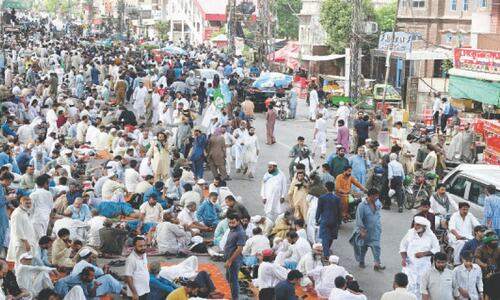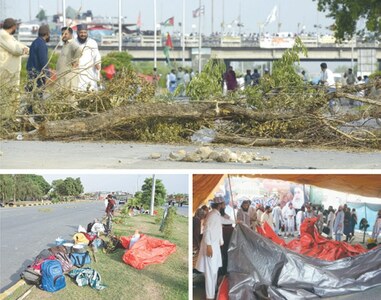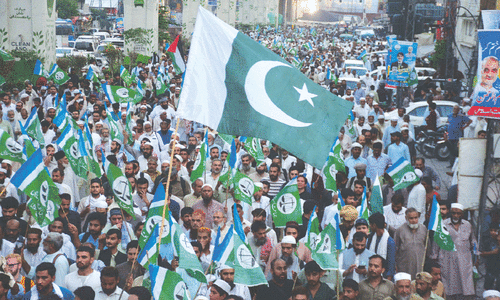ISLAMABAD: The Faizabad Interchange on the border of Rawalpindi and Islamabad has been shut down by protesters so many times that a lingering fear persists among the residents living in its vicinity about how long the interchange will remain open before being blockaded, again.
The closure of the key artery between the twin cities has become a routine feature for political and religious groups, causing traffic problems for the residents. The recently concluded sit-in by the Jamaat-i-Islami (JI) activists was one such protest.
On July 26, the JI protesters entered Islamabad amid roadblocks at various points around Faizabad, halting the public life on Murree Road and movement between the twin cities.
Later that day the party decided to turn back and stage a sit-in at Liaquat Bagh. Days before the JI, the Tehreek-i-Labbaik Pakistan (TLP) had wrapped up its sit-in held at Faizabad for several days.
The impacts of these protests are far-reaching, affecting social structure and the economy of Islamabad. During various protests at Faizabad, there were instances of ambulances being trapped in traffic for extended periods.
The regular sit-ins and blockade of the Faizabad interchange have irked the residents of the twin cities, who think their woes are being ignored.
“I was set to go to visit my relative in Rawalpindi last Friday but unexpectedly Faizabad was blocked and there was no way to reach there due to some political activity,” said Ghulam Abbas, a resident of Margalla Town in Islamabad.
Another resident of the area, Asmat Zehra, said that it took her son three hours to go and bring edible items for ‘niyaz’ during the days of the TLP sit-in, a few weeks earlier.
The residents of Margalla Town and adjoining areas fare the worst because of the Faizabad blockade as light and heavy traffic moves through the Sohan area to Margalla Town and then towards Rawal Chowk and Park Road.
Not only do these sit-ins bring routine activities to a halt, but they also lead to littering in and around the protest site.
For instance, more than two weeks after the TLP dharna ended, the city municipal authorities have yet to clean up the garbage piles and the polythene bags from the site, whereas containers and mounds of mud and pebbles are also lying unattended on Muree Road near the site of the protest.
No stranger to sit-in
The first key sit-in at the Faizabad interchange was held in the winter of 2013 against the killings of Hazara community members in Quetta. Around the same time, Pakistan Awami Tehreek chief Tahirul Qadri marched on Islamabad to demand reforms and dissolution of the government.
A year later, entered the PTI, whose protest paralysed the capital from August 2014 to December 2014. The 126-day protest ended after the Army Public School attack left 141 people dead on December 16 2014.
While the residents of Islamabad did not witness any significant political-based disturbance in the year 2015, lesser-known groups of clerics belonging to the Barelvi school of thought forced their entry into the red zone Islamabad violently on March 27 2016. They were opposed to the hanging of Mumtaz Qadri, whose death sentence was executed a month earlier.
The sit-in at the D Chowk ended on March 30, 2016, without any clear agreement, but it did lead to the emergence of a new leader on the religiopolitical stage — Allama Khadim Hussain Rizvi who later established the TLP. The TLP rose to prominence due to their Faizabad dharna from November 8 to December 18 2017.
Following the general elections in 2018, the PTI came to power and in October 2019, JUI-F chief Maulana Fazlur Rehman launched the 18-day ‘Azadi march’ towards Islamabad demanding the resignation of the government. The sit-in ended without any concrete results.
The following year, the TLP again marched to Islamabad, blocking Faizabad in November 2020 against the sacrilegious caricatures in France and demanded the government expel the French ambassador and boycott French products. The residents of Islamabad and Rawalpindi mainly around Faizabad had a taste of ‘tear gas’ as the police made a failed attempt to disperse the gathering by force.
Tension gripped Islamabad in April 2021 after the TLP announced another sit-in, demanding the implementation of its November 2020 agreement with the government. Barely six months later, the residents in October started witnessing containers and police contingents at the Faizabad interchange and Red Zone due to the threat of another sit-in.
After the ouster of the PTI government in April 2022, the party supporters descended on Islamabad in May 2022. This was followed by another round of special security measures in November 2022 due to the announcement of the ‘Azadi March 2.0’.
This year, the TLP once again returned to Faizabad and blocked the intersection from July 13 to July 19, demanding aid to Palestine and a ban on Israeli products. It also asked the government to declare the Israeli PM a terrorist.
Despite all these sit-ins, the government has not come up with tangible measures to earmark an exclusive space to entertain these protests, so that the routine may continue unhampered and the public does not have to face the brunt.
Published in Dawn, August 12th, 2024



































